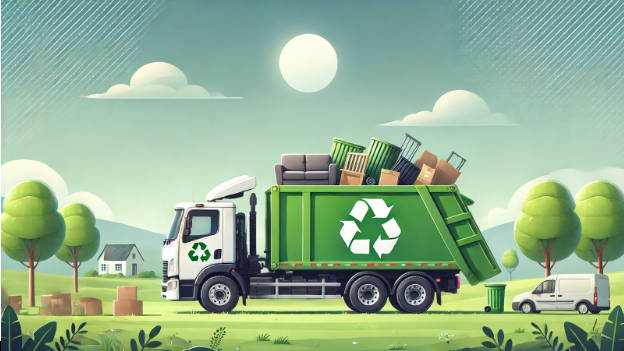
The Complete Guide to Eco-Friendly Junk Disposal for Your Home and Business
Eco-friendly junk disposal is more than just a trend; it’s a necessity for sustainable living. Whether you’re clearing out your home or office, disposing of junk responsibly helps
reduce waste in landfills and minimizes your environmental impact. In this guide, we’ll explore practical ways to recycle, donate, and repurpose junk effectively, providing step-by-step solutions that fit into both personal and business practices.
What is Eco-Friendly Junk Disposal?
Eco-friendly junk disposal involves responsibly getting rid of unwanted items with minimal environmental harm. Instead of just tossing everything in the trash, eco-friendly disposal prioritizes recycling, donating, repurposing, and using specialized services to minimize landfill waste.
Why It Matters:
- Reduces landfill waste
- Conserves natural resources
- Lowers pollution
- Promotes a circular economy
1. Sort Your Junk: The First Step to Sustainable Disposal
Sorting your junk is critical to efficient and eco-friendly disposal. By categorizing items, you can determine what can be recycled, donated, or repurposed.
Steps to Sort Effectively:
- Separate Materials: Create piles for metal, plastic, glass, paper, and electronics.
- Identify Usable Items: Set aside items in good condition for donation.
- Hazardous Waste: Check for chemicals, batteries, and electronics that need special handling.
2. Recycling: What Can and Cannot Be Recycled
Recycling is one of the best ways to dispose of junk in an eco-friendly manner. Many household and office items can be recycled, but knowing what your local facilities accept is crucial.
| Item Type | Recyclable | Non-Recyclable |
|---|---|---|
| Plastics (#1 and #2) | Yes | Styrofoam, plastic bags |
| Metals (aluminum, tin) | Yes | Contaminated metals |
| Paper & Cardboard | Yes | Waxed or coated paper |
| Glass | Yes | Broken or laminated glass |
| Electronics | Special recycling centers only | - |
3. Donation: Give New Life to Old Items
If items are in usable condition, consider donating them. Many charities and organizations accept gently used furniture, clothes, and electronics. This option not only benefits the environment but also helps those in need.
Where to Donate:
- Goodwill: Accepts clothing, electronics, and furniture.
- Habitat for Humanity ReStores: Perfect for furniture and building materials.
- Local Libraries and Schools: Often welcome books and educational materials.
- Animal Shelters: Many accept old blankets, towels, and pet supplies.
4. Repurposing and Upcycling: Transform Junk into Value
Repurposing is a creative way to handle junk by transforming it into something useful. This DIY approach can turn potential waste into functional items.
Repurposing Ideas:
- Wood Pallets: Create a garden bed or DIY furniture.
- Old Clothing: Turn into cleaning rags or quilt pieces.
- Glass Jars: Use for storage, planters, or as decorative elements.
- Broken Electronics: Salvage parts for crafts or sell as spare parts.
Repurposing can often be more fun and rewarding than traditional disposal methods, allowing you to get creative while reducing waste.
5. Eco-Friendly Junk Removal Services
If you have large items or don’t have time to handle junk disposal yourself, eco-friendly junk removal services are a convenient solution. These companies prioritize recycling and donating over landfill disposal.
Top Services to Consider:
- 1-800-GOT-JUNK?: They recycle or donate 60% of what they collect.
- Junk King: Known for their commitment to environmentally friendly disposal.
- College Hunks Hauling Junk: Partner with recycling centers and charities for disposal.
Questions to Ask Before Hiring:
- Do you recycle or donate items?
- What percentage of the junk goes to landfills?
- Are there extra fees for certain types of items?
6. Electronic Waste: Handling E-Waste Responsibly
Electronics, or e-waste, require special disposal due to hazardous components. Improper disposal can lead to soil and water contamination.
How to Dispose of E-Waste Safely:
- Use a certified e-waste recycler: Companies like ERI and E-World Recyclers specialize in electronics.
- Participate in community e-waste events: Many cities hold events for safe e-waste disposal.
- Donate: If functional, donate to organizations in need of computers and other electronics.
Accepted E-Waste Items:
- Computers, tablets, and cell phones
- TV sets and monitors
- Small appliances (toasters, microwaves)
7. Hazardous Waste: Safe Disposal of Chemicals and Batteries
Some household items, like batteries and certain chemicals, are considered hazardous waste and require special handling. Items like paints, cleaners, and pesticides must not go into regular trash or recycling bins.
Hazardous Waste Disposal Tips:
- Local Collection Centers: Most municipalities have designated facilities for hazardous waste.
- Retail Drop-Off: Many hardware and electronics stores accept batteries and light bulbs.
- Annual Collection Events: Check local government websites for hazardous waste event dates.
Frequently Asked Questions (FAQs)
1. Why is eco-friendly junk disposal important?
Eco-friendly junk disposal reduces environmental impact by minimizing landfill waste, conserving resources, and lowering pollution levels.
2. What items can I donate?
You can donate gently used furniture, clothes, electronics, books, and even building materials, depending on the charity’s needs.
3. Can I recycle all types of plastics?
Only certain types, like #1 (PET) and #2 (HDPE), are commonly accepted in most recycling programs. Check with your local facility for specifics.
4. How can I dispose of hazardous waste?
Contact your local waste management or municipal government for guidelines on hazardous waste disposal. They may have collection centers or special event days for such items.
5. Are eco-friendly junk removal services expensive?
While they may cost more than standard services, eco-friendly options focus on responsible disposal, often donating or recycling as much as possible.

